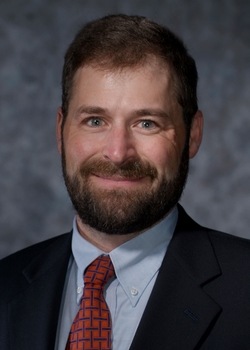Report: Schools of Choice Can Boost Civic Values
FAYETTEVILLE, Ark. — Schools of choice, both private and public, often do a better job of boosting civic values among their students than assigned public schools, according to a new study published in the summer issue of Education Next, a scholarly journal of Stanford University’s Hoover Institution.
Patrick J. Wolf, who holds the Twenty-First Century Chair in School Choice at the University of Arkansas, conducted a meta-analysis of 21 quantitative studies and found that schools of choice, whether private schools or public charter schools, tended to fare as well or better than assigned public schools at steeping their students in seven civic values necessary for democratic citizenship: political tolerance, voluntarism, political knowledge, political participation, social capital, civic skills and patriotism.
The peer-reviewed article by Wolf, a professor of education reform in the UA College of Education and Health Professions, is available online at http://www.hoover.org/publications/ednext. A list of the studies used in his review is also available on the site. The summer issue of Education Next will be mailed to subscribers and posted online in its entirety May 21.
“Many commentators claim that government-run public schools are necessary to instill civic values in American students,” Wolf said. “But the evidentiary base just doesn’t support that assertion. People have been afraid that schools of choice would create a sort of separateness like gated communities. The statistical studies on that question don’t support that claim at all.”
There’s no way to know for sure why the schools of choice appeared to do a better job at teaching civic values, Wolf said. One possibility is that these schools, particularly private schools, operate in an atmosphere of stricter order and discipline that makes students feel more comfortable interacting with others from different backgrounds and tolerating others’ opinions with which they disagree, he said. Wolf found no evidence that the coursework in civic classes solely produced the results.
A majority of the 59 findings from the 21 studies suggested that the effect of private schooling or school choice on civic values (as compared to traditional public schools) is, if not neutral, then mostly positive. Among the more rigorous studies, more than half of the 23 findings (52 percent) showed school choice or private schooling as having statistically significant positive effects on civic values; 10 findings showed a neutral effect. Only one finding showed traditional public schooling arrangements to be better at enhancing civic values. Rigorous studies are those that control for selection bias in addition to differences in student backgrounds in the various schools.
“These results suggest that the expansion of school choice is more likely to enhance than diminish the civic values of our next generation of citizens,” Wolf wrote.
Wolf’s article in Education Next expands on a chapter he wrote for Getting Choice Right: Ensuring Equity and Efficiency in Education Policy (Washington: Brookings, 2005), adding two more studies to the 19 he examined for the book chapter, “School Choice and Civic Values.”
The studies in Wolf’s examination included a combination of some done with information from national databases and others done with field data collected expressly for the analysis of civic values.
When specific civic values were examined, at least some positive effects were usually found in schools of choice whenever statistically significant differences were identified. For instance, in studies of political tolerance, Wolf’s research revealed that, with one exception, the findings were in the neutral-to-positive range. Fifty percent of the findings — 11 out of 22 — indicated that schools of choice increase political tolerance.
In studies of voluntarism, 57 percent of the findings showed a school choice advantage; only 1 of the 14 findings showed a traditional public school benefit. Specifically, the findings reveal higher voluntarism among students in religious schools, parents of students in religious schools, parents who homeschool, students in any type of private school and students in public charter schools.
Studies of political knowledge, political participation, civic skills and social capital all overwhelmingly showed a school choice benefit. No findings saw a traditional public school advantage regarding the inculcation of those four civic values.
Most of the studies Wolf examined compared students in private schools with those in public schools; three compared results for students in charter or magnet schools with those in public schools.
Contacts
Patrick J. Wolf, professor of education reform, Twenty-First
Century Chair in School Choice
College of Education and Health Professions
(479) 575-2084, (479) 445-9821, pwolf@uark.edu
Heidi Stambuck, director of communications
College of Education and Health
Professions
(479) 575-3138, stambuck@uark.edu
Headlines
Join the Office for Sustainability on a Final Cruise to Campus
Cruise to Campus Wednesdays have fostered a gathering space for individuals interested in biking to campus. Drop by the Old Main Lawn from 7:30-10 a.m. Wednesday for coffee, something to eat and conversation.
Fay Jones School Student Ambassador Program Gives Voice to Design Students
The student ambassador program at the Fay Jones School of Architecture and Design is built to connect top design students with their school, its alumni, its future students and others inside and outside the school.
Honors College Selects Executive Board for Student Ambassadors Program
The board consists of seven officers, including honors students Abdullah Asif, Esther Beller, Ria Collins, Daniella Fernandez, Alekhya Kavi, Olivia MacDonald and Kennedy Williams.
Goering Named Kansas State University Alumni Fellow
Christian Goering, a professor of curriculum and instruction in the College of Education and Health Professions, was recently named a 2024 Alumni Fellow by Kansas State University.
Shanita Sanders to Discuss Museum Exhibit Organization for Arkansas Folklife Web Series
On May 15, Sanders will discuss her recent internship experience, heritage museums, tourism sites and how she has self-documented her student projects.





